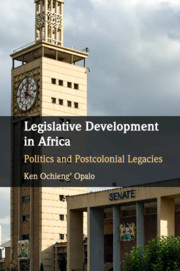Book contents
- Frontmatter
- Dedication
- Contents
- List of Figures
- List of Tables
- Preface
- Acknowledgements
- 1 Introduction
- 2 Legislative Development in Africa
- 3 Intra-Elite Politics and Credible Commitment
- 4 Colonial Origins of Parliaments in Kenya and Zambia
- 5 Elite Control and Legislative Development
- 6 Legislative Institutionalization in Time
- 7 Electoral Politics and Legislative Independence
- 8 Conclusion
- References
- Index
- References
References
Published online by Cambridge University Press: 17 June 2019
- Frontmatter
- Dedication
- Contents
- List of Figures
- List of Tables
- Preface
- Acknowledgements
- 1 Introduction
- 2 Legislative Development in Africa
- 3 Intra-Elite Politics and Credible Commitment
- 4 Colonial Origins of Parliaments in Kenya and Zambia
- 5 Elite Control and Legislative Development
- 6 Legislative Institutionalization in Time
- 7 Electoral Politics and Legislative Independence
- 8 Conclusion
- References
- Index
- References
- Type
- Chapter
- Information
- Legislative Development in AfricaPolitics and Postcolonial Legacies, pp. 248 - 272Publisher: Cambridge University PressPrint publication year: 2019

